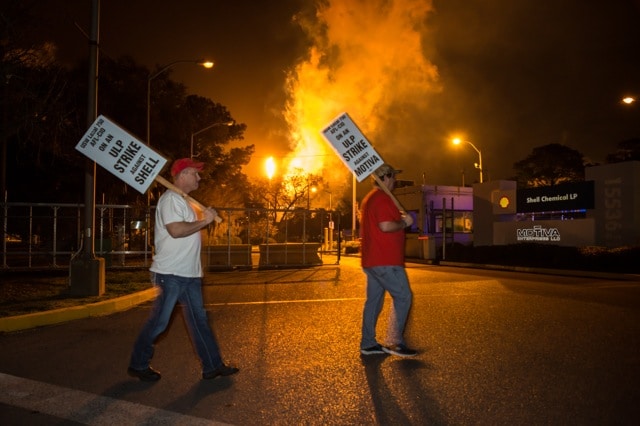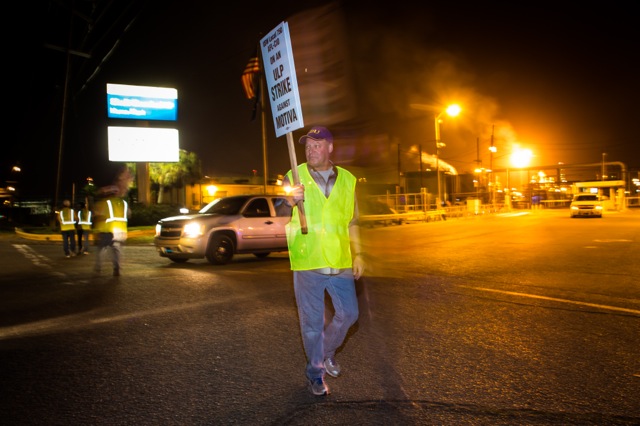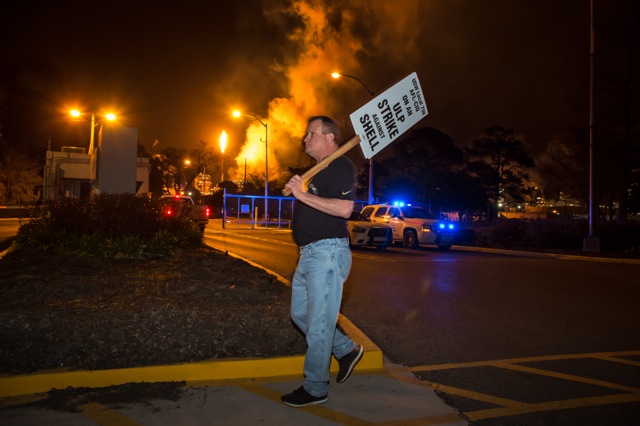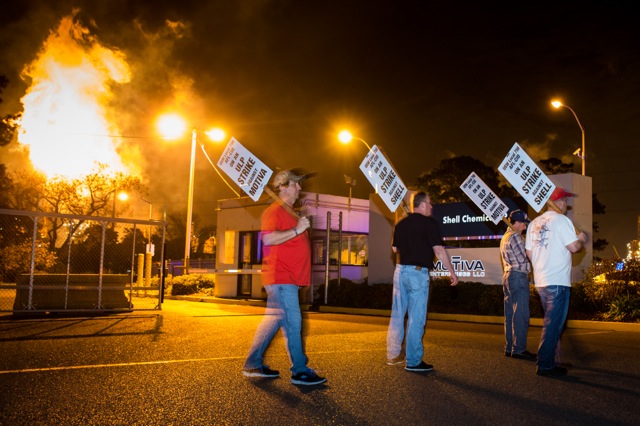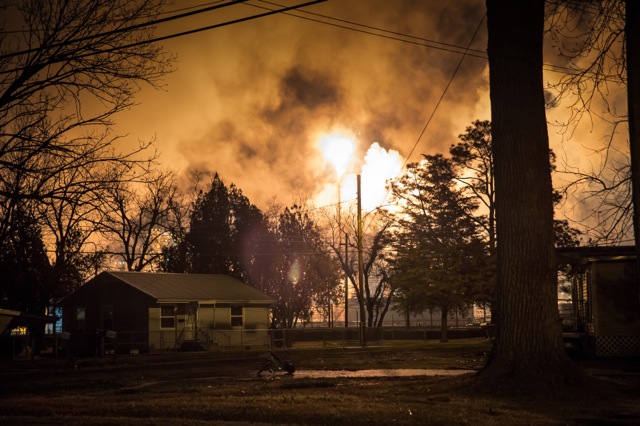Workers at Shell and Motiva refineries in Norco, Louisiana, about 30 miles west of New Orleans, have joined the growing national United Steelworkers Union (USW) strike. In total, 15 facilities are now striking, making this the largest refinery strike since 1980.
On the second night of the strike in Norco, a giant flare at the Shell refinery illuminated the workers on the picket line, serving as a reminder of the dangers that come with working at refineries.
“There are a lot of hazards out here,” Bryan Shelton, a media liaison for the union, said. “If you have that much hydrocarbon in one area, you have a chance for a lot of things to go wrong, so if you have someone working too many hours that is a dangerous thing.”
Members of USW picket in front of refineries run by Motiva and Shell in Norco, Louisiana. ©2015 Julie Dermansky
Members of USW picket in front of refineries run by Motiva and Shell in Norco, Louisiana. ©2015 Julie Dermansky
In Norco, the union has a tentative agreement on local issues, which Shelton declined to specify. Nationally, however, he had plenty to say: “The company is not negotiating in good faith. They are not making progress on any of our major requests.”
Shelton stressed to DeSmogBlog that “the strike is not over wages, it is over working conditions and staffing.”
Workers in the USW began their strike at nine facilities on Feb. 1. Nearly 6,600 have now chosen to stand up for safer workplaces and fair contracts, according to the USW, which represents 30,000 workers at more than 200 facilities.
After the additional plants, including the refineries in Norco, went on strike last weekend, Royal Dutch Shell, which is leading the negotiations for U.S. refinery owners, expressed frustration. “We believe this move sets the wrong tone for both parties to move forward and reach an agreement,” a statement on Shell’s website reads. “We remain committed to continued safe operations and productive negotiations.”
Members of USW picket in front of refineries run by Motiva and Shell in Norco, Louisiana. ©2015 Julie Dermansky
The refinery workers and the refinery owners appear to be no closer to an agreement than they were when negotiations broke down in late January, kicking off the strike. “The offers made were not much different from each other,” Shelton said. Nationwide, the union feels there has been minimal movement on key concerns.
The issue of limiting contract workers is a sticking point for industry negotiators, who don’t want the union to dictate the industry’s usage of contractors by restricting their use of non-union contract workers. A memo sent to Motiva employees, signed by company President and CEO Don Romasko and obtained by the Daily Picayune, said the sticking point “is not safety, fatigue, health care, or even wages, as the union claims.” Instead, it is the USW‘s ”insistence that we replace routine maintenance contractors with USW-represented employees.”
But the use of contract workers is tied to the USW‘s safety concerns. The union isn’t against contract workers being used, such as during turnaround, when work done at the refineries needs lots of extra hands, according to Shelton. The union wants Shell to increase staff numbers to lessen the amount of overtime current workers have to put in, and thus create safer worker conditions.
Members of USW picket in front of refineries run by Motiva and Shell in Norco, Louisiana. ©2015 Julie Dermansky
It is not uncommon for union workers to put in more than 60 hours per week, which works out to over 1,000 hours a year. Limiting the number of outside contractors performing day-to-day maintenance on refinery units would ensure the need for new hires, and cut back mandatory overtime, according to Shelton.
Environmental groups including the Louisiana Bucket Brigade, the Sierra Club and the Green ARMY joined the picket line on Feb. 26 to show their support for the union.
“I’ve been in communication with the steelworkers now for about 10 years, and every year I hear the same story, they’re laying off one or two trained people every year,” Anne Rolfes founding director of the Louisiana Bucket Brigade, told Bill Capo of WWL News.
The recent explosion at an Exxon Mobil refinery in Torrance, California, near Los Angeles, which happened after the strike began and injured three workers, is another reminder of the dangers of refinery work, as if we needed one.
And a massive flare-up at the BP Whiting Refinery in Whiting, Indiana, on Feb. 23, raised the concern that the longer the strike goes on, the more the public is at risk.
Findings of the U.S. Chemical Safety Board that determined worker fatigue was a factor in the cause of an explosion at the Texas City BP Plant in 2005, which killed 15 workers, are part of the USW’s rationale.
“Driving fatigue is thought to be worse then driving drunk,” Shelton said. “Every one is being asked to do more with less. We have been doing more with less, but it is at the point where it is not sustainable.”
Sky in Norco illuminated by a flare at the Shell Refinery in Norco, Louisiana. ©2015 Julie Dermansky
All photos ©2015 Julie Dermansky
Subscribe to our newsletter
Stay up to date with DeSmog news and alerts


